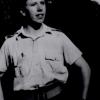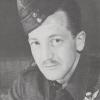Driver Ernest Barker Field 2129815 591 (Antrim) Parachute Squadron, RE
Ernest Barker Field was the third child and only son of Thomas and Eliza Field. He was born at 27 Back Green, Churwell, on 2nd July 1920. He was one of four children, with older sisters Alice and Elizabeth (Bessie) and a younger sister Lilian.
In common with his siblings, during his childhood Ernest received books in recognition of regular Sunday School attendance at Back Green Methodist Chapel. He was a pupil at Churwell school and in his youth played soccer for Churwell Old Boys football team.
After leaving school Ernest worked at the Beacon Works, Morley, which at that time supplied the whole of the UK with glass Belisha Beacons. It is not clear how long he was employed there but by the time he joined the army in 1940 he was working in the Rolling Department at the W. L. Ingle Leather Tannery at Millshaw, Churwell.
On joining the army Ernest was assigned to the 591 (Antrim) Field Company of Royal Engineers. The Company had originated as the Antrim Fortress Company, a territorial army group in Northern Ireland, but in 1940 its territorial status changed when it became part of 2 Corps. In January 1941, as 591(Antrim) Field Company RE it was based in Halifax and later in Ely, Cambridgeshire. The Company subsequently became part of 54 Division and for a time was based at Woodbridge, Suffolk.
In May 1943, in preparation for the Allied invasion of Normandy, the 591 (Antrim) Field Company RE converted to a parachute role and was assigned to the newly formed 6th Airborne Division based at Bulford, Wiltshire. After conversion the Company was renamed 591 (Antrim) Parachute Squadron RE. In the Airborne conversion exercise the Company was required to take part in a selection process at the Airborne Forces Depot at Hardwick Hall, Derbyshire. The purpose of the exercise was to identify those who possessed the high degree of fitness, stamina and self discipline essential in a paratrooper. Having come through the selection process successfully Ernest went on to be trained as a parachutist. He was on Course 69B at RAF Ringway, Manchester, from 21st June to 1st July 1943. The course instructor’s notes recorded at the time that Ernest ‘worked hard and attained a good standard.’
The 591 (Antrim) Parachute Squadron RE spent the following months honing tactical and military skills, its members being subjected to even more intense physical training in readiness for what was expected of them in the D Day invasion of Normandy.
Ernest was assigned to Troop 1 of the Squadron, which took off in Stirling aircraft from Fairford, Berkshire at 23.30 on the night of 5th June 1944, bound for the Ranville-Le-Hom area on the Caen-Cherbourg peninsular in Normandy. One of the first objectives of Troop 1 was to capture Ranville and having accomplished this they were to fight on as infantry, laying mines to secure the area and carrying out whatever sapper duties were required. In almost constant danger and discomfort the Squadron remained in Normandy for just under three months, ultimately taking part in the pursuit of the enemy south eastwards until Pont Audemer had been taken. Ernest was wounded at some point during his time in France, though the exact nature and extent of his injuries is not known.
By the end of August 1944 the Squadron’s part in the Normandy campaign was complete. Ernest returned to England, where he remained until 21st December 1944 when the Squadron was dispatched to Belgium, at the start of the Ardennes Campaign. Christmas Eve that year was spent in a transit camp in Ostend, then on 29th December, in thick snow and sub-zero temperatures 591 (Antrim) Squadron RE began to advance towards Grupont.
Enemy resistance was fierce but Grupont was eventually captured towards the end of January 1945 and the Squadron was relocated to Holland to patrol the river Maas in the area of Venlo and Roermond. The troops then faced the hazardous task of crossing the wide river, which was in full flood, battling against strong currents in small assault craft and dealing with enemy mines on the occupied bank to prepare the way for the Allied advance towards Germany.
In the third week of February the Allies had crossed the Maas and the Squadron was recalled to Wiltshire to prepare for the role it would play in the airborne element of the Allied push across the river Rhine into Germany.
Troops were given seven days leave before preparations for the airborne operation began and not surprisingly Ernest headed home to Churwell to see his family. He also managed to share some happy moments with several of his friends who were on leave from various other branches of the armed forces.
Sadly, this was the last time he was to see any of them because barely a month after returning to England from Holland, 591 (Antrim) Parachute Squadron RE was deployed on Operation Varsity, the codename for the airborne crossing of the river Rhine.
At 05.30 on the morning of 24th March 1945 Ernest took off from England by glider, in the company of his Troop Captain and two other Royal Engineers. The glider, scheduled to land in the vicinity of Hamminkeln in Germany, also carried a jeep and trailer loaded with mine clearance stores, explosives, tools and other RE equipment required for the Allied advance. Ernest was the designated driver of the jeep.
The journey went according to plan but on reaching their drop and landing zones airborne troops were met by intense defensive fire, with shells from the considerable number of German flak guns in the area bursting amongst men and gliders as they descended. In these terrible conditions it appears the glider in which Ernest was travelling reached the correct landing zone intact. Tragically, however, almost as soon as it had grounded it came under enemy fire.
The whole of Operation Varsity is detailed in the 591 (Antrim) Parachute Squadron RE War Diary for 24th March 1945 and contains a report of the glider landing which states: ‘It is believed that this glider landed safely but it was then shot at by an 88mm gun at 100 yds range.’ The War Diary of the Royal Engineers for the same date also records the incident and confirms there were no survivors of the attack.
At the tender age of 24, having served his country for more than four years and surviving months of fierce fighting and harsh conditions in France, Belgium and Holland, Ernest and had paid the ultimate price, only a few weeks short of the Allied declaration of Victory in Europe.
Initially buried in the area in which he died, in 1947 he and many other brave young men who fell that day were transferred from their temporary graves and laid to rest in the peaceful, dignified surroundings of Reichwald Forest War Cemetery at Kleeve in Germany.
Catherine Barker Holmes (daughter of Ernest Field’s sister, Alice)
Catherine Barker Holmes
Source: Catherine Barker Holmes
Read More




Latest Comments
There are currently no comments for this content.
Add Comment
In order to add comments you must be registered with ParaData.
If you are currently a ParaData member please login.
If you are not currently a ParaData member but wish to get involved please register.